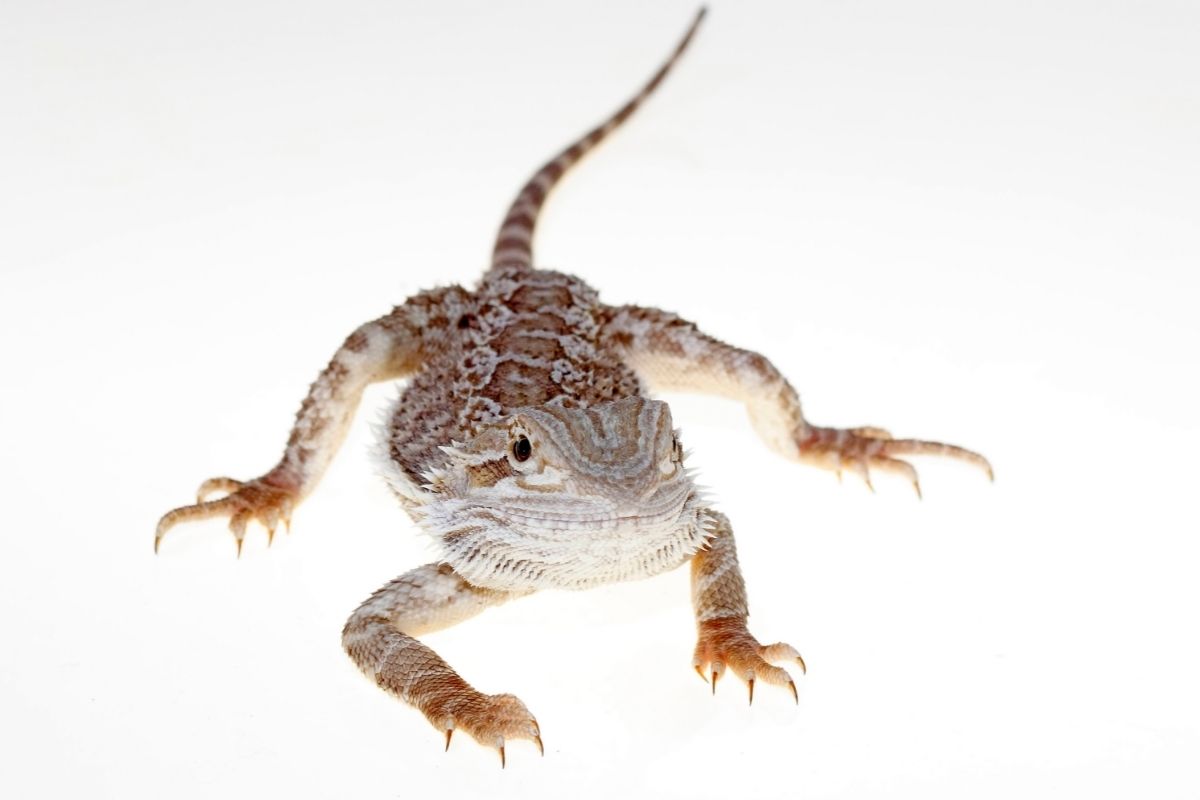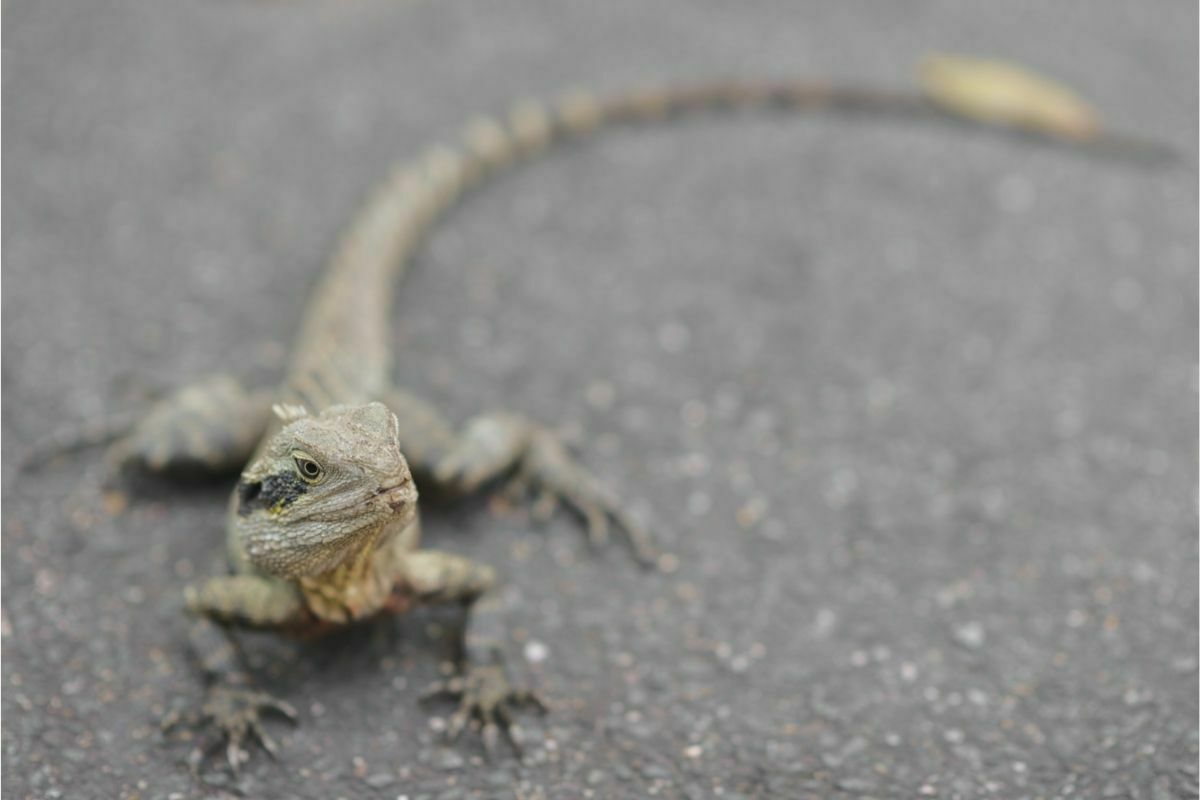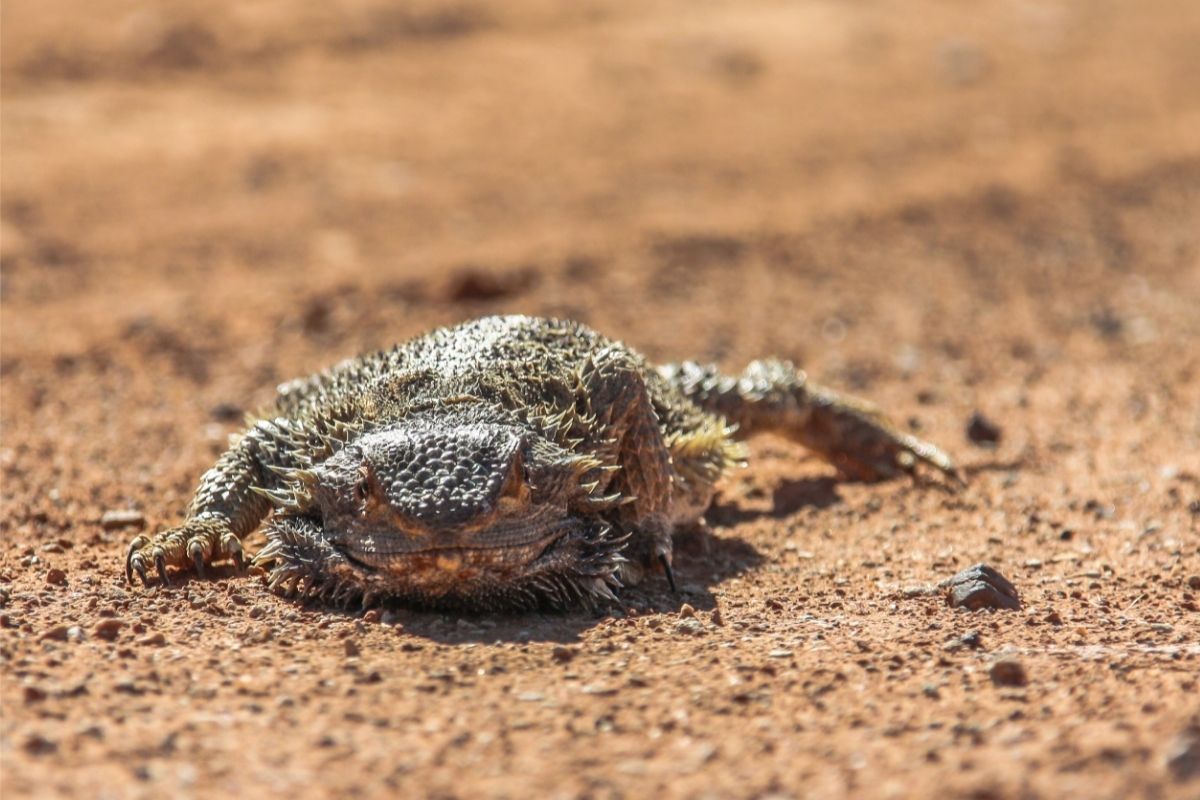Bearded dragons are popular pets – and it is easy to see why with their friendly nature, natural intelligence, and great personalities.

Learning to care for your beardie properly is crucial in helping them to stay safe, happy, and content at all times – and this includes ensuring that they have a suitable, nutritious diet.
To help, we have put together everything you need to know to feed your bearded dragon – including whether or not they can enjoy a treat of sweet potato!
About Bearded Dragons
Bearded dragons are popular pets, and can make a great addition to your family.
What Is A Bearded Dragon?
Bearded dragons are lizards native to Australia and New Guinea. They are the only species within the family Agamidae to be found outside of those two countries.
Their name comes from the fact that they grow hair on their faces.
Does Sweet Potato Offer Any Health Benefits To Your Bearded Dragon?
Sugar-rich sweet potatoes can be beneficial to your bearded dragon if you feed them regularly. They are packed with potassium, magnesium, and Vitamin A.
Potassium is important for healthy heart function and muscle contraction. Magnesium is necessary for maintaining proper nerve functioning and blood pressure.
Vitamin A is essential for eye health and growth, and sweet potato is packed full of this.
Sweet potatoes are also a good source of dietary fiber. Dietary fiber aids digestion by helping with the elimination process.
Are There Concerns About Feeding Sweet Potatoes to Your Bearded Dragon?
There are no real concerns about feeding your bearded dragon sweet potato, as long as this is enjoyed in moderation, and is fed as part of a wider, healthy balanced, and varied diet.
Sweet potato is very high in Vitamin A, and this vitamin is responsible for many bodily functions.
The main thing to be aware of is that sweet potatoes can have an unbalanced phosphorus to calcium ratio, and this is a result of the elements that make up the vegetable.
Phosphorus is an element that can bind to calcium and can prevent it from being properly absorbed into the body – in the long term, this can result in a calcium deficiency.
To keep your dragon as healthy as possible, you should ensure that their diet is low in phosphorus while
remaining high in calcium – once again, the key priority here is that your dragon’s diet is rich and varied, with lots of choice and balance.
Why Are Bearded Dragons So Popular?
Bearded dragons have become popular because they are relatively easy to care for. They require little maintenance and are generally quiet. In addition, they are small and cute, making them ideal pets for children.
How Long Do Bearded Dragons Live For?
Most bearded dragons live between five and ten years. However, there are some who reach 15 years old.
Are There Different Types Of Bearded Dragons?
There are three different types of bearded dragons:
1. Common Bearded Dragons – This type of lizard has a maximum length of around 10 inches. They come in a variety of colors such as red, blue, yellow, black, and green.
2. Crested Bearded Dragons – These lizards have a distinctive crest on their head. They are usually larger than common bearded dragons.
3. Dwarf Bearded Dragons – These are smaller versions of common bearded dragons. They are often kept as pets, especially when they are babies.
Are Bearded Dragons Easy Pets?
Yes, bearded dragons are very easy pets. They are active during the day and sleep most of the time. They are generally peaceful animals and don’t pose much danger to humans. Most beardies are also pretty well-behaved!
How To Care For A Bearded Dragon: The Basics
If you’re thinking about getting a bearded dragon for yourself or someone else, then you’ll need to know how to properly care for one.
This guide will give you everything you need to know about caring for and feeding a bearded dragon, so you won’t have any problems providing your pet with the best possible nutrition.
The first thing that you’ll need to do is find a suitable enclosure for your bearded dragon.
You’ll probably want to choose somewhere where it’s safe and secure, but not too big. It’s also a good idea to provide your bearded dragon with plenty of hiding places so that it feels comfortable and safe.
Next up, you’ll need to think about what food you plan on giving your bearded dragon.
There are a number of different options available, including fruit, vegetables, meat, fish, insects, worms, crickets, and even live mealworms.
Your bearded dragon will eat whatever it wants, but if you’d like to encourage it to consume certain items, try adding a little bit of these things into its diet.
Once you’ve decided which type of food you would like to feed your bearded dragon, you’ll need to prepare it.
If you’re planning on feeding him fruit, you’ll need to wash it thoroughly before placing it in his enclosure.
Some fruits, such as apples, mangoes, peaches, nectarines, grapes, plums, pears, and apricots, will require no preparation at all.
However, other fruits, such as bananas, strawberries, blueberries, raspberries, blackberries, cherries, and melons, will need to be washed.
Finally, you’ll need to ensure that your bearded dragon has enough space to move around.
He needs lots of room to stretch out and play, so don’t forget to leave some open areas. Make sure that there are plenty of hiding spots, too.
What Do Bearded Dragons Eat?
Bearded dragons are omnivorous reptiles which means that they will eat both plant and animal matter.
This means that they will happily consume any food that you give them, but the main types of foods that they prefer include:
- Fruit And Vegetables
Fruits and vegetables form a key part of your bearded dragon’s diet and should be included regularly,
as they are excellent sources of vitamins, minerals, and nutrients – all elements that are essential for the growth and development of your bearded dragon.
You can get fruit and veggies in many forms, including fresh fruits and vegetables, dried fruits and nuts, citrus fruits, frozen fruits and vegetables, and canned fruits and vegetables.
Where possible, fresh tends to be the best option for your dragon.
The following fruits and vegetables are recommended: Apples, bananas, carrots, celery, corn, cucumbers, figs, grapes, kiwi fruit, lettuce, melons, onions,
peaches, pineapples, potatoes, pumpkins, squash, strawberries, tomatoes, watermelon, zucchini.
- Insects
Many bearded dragons are also partial to insects as part of their diet, and may even eat them as a snack.
Insects are available in various forms, including crickets, mealworms, wax worms, silkworms, grasshoppers, ants, cockroaches, and more.
- Worms
In addition to insects, many beardies enjoy worms in their diet. Worms are available in various sizes and shapes and can be purchased online or through pet stores.

- Greens
Some bearded dragons like to eat greens too, so you should ensure that these are always an important part of their diet.
Greens include leafy greens such as spinach, kale, collard greens, dandelion greens, lettuce, mustard greens, arugula, beet leaves, broccoli stems, turnip greens, cabbage, and other leafy greens.
- Meat
Bearded dragons are carnivores by nature, and will eat meat if it is offered to them – they are not terribly picky eaters!
Meat includes chicken, beef, fish, lamb, pork, turkey, rabbit, venison, duck, goose, wild boar, squirrel, and more.
- Fish
As with meat, fish is another food item that beardies love to eat. Fish comes in all sorts of varieties, including catfish, carp, trout, salmon, tilapia, cod, bass, eels, perch, pike
gurnards, snapper, flounder, shark, sardines, herring, mackerel, mullet, anchovies, pilchard, shrimps, crabs, lobsters, shrimp, oysters, mussels, clams, frogs and more.
- Dairy Products
Bearded dragons are lactose intolerant, meaning that they cannot digest dairy products. However, some people keep them anyway because they do enjoy cheese, milk, and yogurt.
If you decide to feed your lizard dairy products, make sure that he only eats small amounts at a time, and never feeds him anything that has been left out overnight.
- Nuts And Seeds
Bearded dragons are also known to enjoy eating a wide variety of nuts and seeds, and this is something that you should definitely consider offering to them.
Nuts come in different sizes, shapes, and flavors, and include cashews, almonds, peanuts, hazelnuts, walnuts, pecans, pistachios, Brazil nuts, pine nuts,
and coconut, macadamia nuts, chestnut, filberts, sunflower seeds, pumpkin seeds, sesame seeds, and more.
- Citrus Fruits
As we mentioned, bearded dragons love citrus fruits, and often enjoy consuming them when given the chance.
Citrus fruits come in many different varieties, including oranges, lemons, grapefruits, tangerines, limes, kumquats, clementines, mandarins, pomelos, and more.
- Whole Grains
Whole grains should form an important part of your beardies diet, and there are many types of whole grain foods that they can enjoy.
Whole grains include oats, barley, wheat, corn, rice, millet, quinoa, buckwheat, amaranth, sorghum, teff, spelt, rye, bulrush, tapioca, triticale, graham flour, farina, semolina, couscous, polenta, hominy, grits, and more.
- Eggs
Many dragons will also enjoy eggs as part of their diet, especially those that have just hatched.
Eggs come in several different varieties, including duck, hen, ostrich, emu, goose, quail, pigeon, dove, chukar partridge, guinea fowl, geese, turkeys, chickens, ducks, quails, grouse, and more.
- Supplements
You may also wish to enrich your dragon’s diet with supplements; calcium supplements in particular can be very important for healthy bone development.
Other supplements that you might want to offer include vitamin D3, omega-3 fatty acids, probiotics, antioxidants, digestive enzymes, and others.
You should always keep an eye on what your bearded dragon eats as some may be allergic to certain foods.
If you notice any signs of discomfort or illness then you should seek veterinary advice immediately.
How Much Should I Feed My Bearded Dragon?
The amount of food that you provide to your bearded dragon will depend on its age, size, and health. You should aim to provide a minimum of 1-2g per kg of body weight each day.
For example, if your bearded dragon weighs 2kg then you would ideally feed it around 4g of food daily. However, if it is very young or ill then you might only want to feed half this amount.
If you are unsure about how much food to feed your bearded dragon then you should speak to your vet first.
They will be able to advise you based on your specific circumstances. Food and nutrition requirements will also vary as your pet grows – an adult bearded dragon will need more food than a baby dragon.
Can Bearded Dragons Eat Meat?
Yes, bearded dragons can eat meat. In fact, many people choose to do so because it is easier than feeding insects and worms.
It is important to note though that meat has different nutritional values compared to other foods and therefore needs to be fed carefully.
The best way to ensure that your bearded dragon gets enough protein is by providing them with a mixture of
insect larvae and meaty bones – this will offer a well-rounded diet with all of the nutritional value and elements that they need to stay healthy and strong.
How Long Does It Take Them To Digest Food?
Your bearded dragon’s digestive system works like a normal reptile’s. Their stomach is divided into three sections – the fore stomach, mid-stomach, and hind stomach. Each section serves a different purpose.
The fore stomach acts as a storage area where food is stored until it reaches the next part of the digestive tract.
The mid-stomach then helps break down the food before it enters the small intestine, while the hind stomach contains enzymes that help break down the food further.
The time required for digestion varies depending on the type of food that your bearded dragon consumes. Some foods take longer to digest than others.
Foods That Are Easier To Digest
Grains
Grains such as rice, oats, wheat, and corn have been found to take less time to pass through the gastrointestinal tract. This means that they are digested more quickly.
Legumes
Legumes include beans, peas, and lentils. They contain high levels of protein and fiber which makes them an ideal choice for reptiles.

Nuts and seeds are also easy to digest. They provide a good source of energy and contain a lot of protein.
Whole Grains
Whole grains including brown rice, wholewheat pasta, and oatmeal are also easier to digest. They give your bearded dragon a balanced meal.
Meat
Meat is one of the easiest things to digest. It provides a great number of calories in a short period of time.
Fish
Fish is another easy food to digest. It is rich in protein and low in fat content.
Dairy Products
Dairy products are also very easy to digest. They contain calcium and phosphorus which are needed for bone formation.
Eggs
Eggs are a complete protein containing all nine amino acids. They are also a good source of vitamin D and B12.
What Is The Best Way To Feed My Bearded Dragon?
Your bearded dragon needs a diet consisting of a variety of foods. You should ensure that they get enough vitamins and minerals from their diet.
You should make sure that your bearded dragons’ diets consist of at least 50% fresh vegetables. These include leafy greens like spinach, kale, and lettuce.
You should also add some fruits like apples, oranges, and bananas to your bearded dragons’ diets.
You should avoid feeding any raw meat or bones to your bearded dragons. If you do this, they will not be able to break down the proteins properly.
Final Thoughts
In conclusion, when choosing a bearded dragon, remember that they are intelligent animals who will appreciate being provided with the right kind of care.
By following this guide, you should be able to learn everything you need to know in order to get started caring for your new pet.
